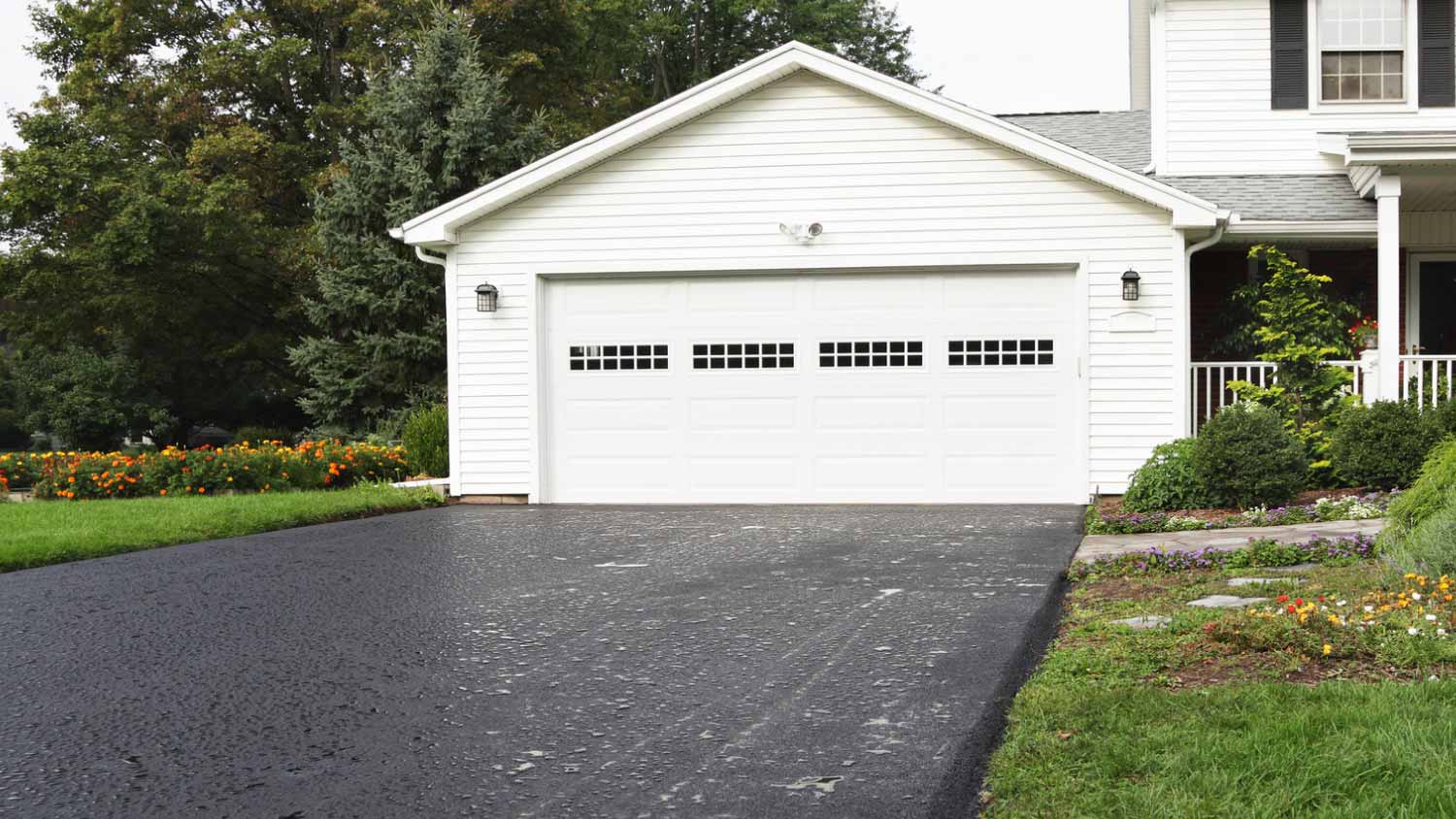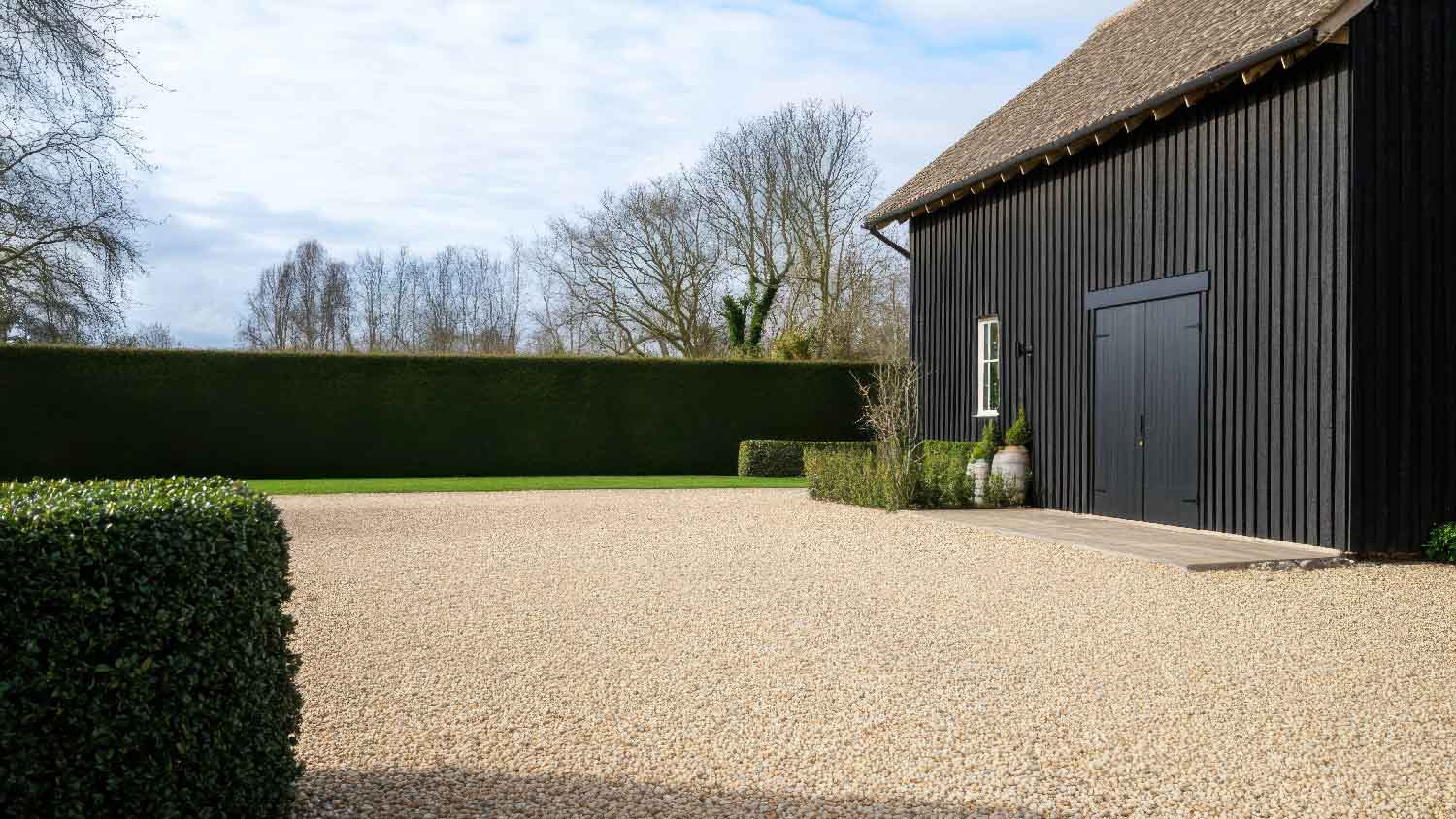
The cost to build a road on your property can be high, but the utility is often worth it. Use this cost guide to see how much this project will cost.
The differences lie in the details


Tarmac can only be applied as a hot mix, posing more restrictions on working conditions.
Asphalt is more durable and chemical resistant than tarmac.
Asphalt costs $2 to $6 per square foot, not including labor.
Tarmac is only suitable for small residential driveways whereas asphalt has more robust applications.
Since tarmac and asphalt are both common materials for driveways, they naturally share many similarities. However, these two materials are fundamentally different. If you’re considering building a new driveway, you should learn the differences between the two most common driveway surface materials. This will help you choose the more suitable option based on your needs, location, climate, and budget.
Tarmac and asphalt are two of the most commonly used surface materials for driveways. However, they differ in composition, durability, appearance, application, and cost. The table below provides a glance over their different properties.
| Differences | Tarmac | Asphalt |
|---|---|---|
| Appearance | A coarse, impermeable surface | Usually has a smoother finish, although porous and rough surfaces are also available. |
| Composition | A mixture of aggregates and tar. The modified tar serves as the binder. | A mixture of aggregates and bitumen, sometimes with add-mixtures and modifiers. Bitumen serves as the binder. |
| Durability | Fairly durable, but vulnerable to petrol and diesel spills | High strength and durability. Higher chemical resistance, but vulnerable to oil. |
| Cost | More cost-efficient for smaller driveways. | $2 to $6 per square foot. Higher-grade products will cost more. |
| Application | Mainly only good for small residential driveways and must be applied as a hot mix. | Can be used for residential driveways and public roads and parking lots. More robust in application as it can be used as a half-warm, warm, or hot mix. |
| Environment | Only recyclable as unbound aggregate or when it’s used in mineral cement emulsion mixtures. | Fully recyclable and can be reused |

Looking from a distance, tarmac and asphalt driveways might appear similar. However, a closer look would reveal the details in front of your eyes.
Tarmac tends to have a coarse surface that may sometimes look uneven. Although the surface appears to be porous, tarmac is impermeable. Meanwhile, asphalt, by default, comes with a smoother finish. There are also porous and rough asphalt variations for those looking for a different texture.
Tarmac and asphalt are fundamentally different due to their compositions. Tarmac is a mixture of aggregates and tar, thus the name “tar-mac.” Tar, a natural black liquid, is extracted from large tar pits in the ground. Mixed with sand or crushed rocks, tarmac forms a bound and durable surface when compacted into one place.
Asphalt is a mixture of aggregates and bitumen, a thick, sticky, petroleum-based substance. Many asphalt products also add other modifiers to achieve specific properties.
Asphalt is stronger than tarmac due to bitumen’s flexible nature and can withstand most chemicals. However, asphalt is weak against oil. On the other hand, tarmac is less durable than asphalt and more vulnerable to diesel and gasoline spills.
Asphalt is also more resistant to extreme weather conditions such as excessive snow and heavy hail. Tarmac is waterproof, but doesn’t do as well against inclement weather. Its rough surface also causes water to pool up after a storm posing risks of slipping and falling.
An asphalt driveway costs $2 to $6 per square foot for materials although modified products could cost significantly more. While tarmac is around the same cost, it is slightly more affordable if only paving a small driveway without concerns of high traffic volumes.
In most cases, tarmac can only be applied as a hot mix, making its working conditions more restrictive. Asphalt can be applied as a hot, warm, or semi-warm mix, meaning you can pave a driveway with asphalt in most seasons throughout the year.
Asphalt is more environmentally friendly because it is fully recyclable. When asphalt on a driveway gets old, you can simply reclaim it and reapply it elsewhere. On the other hand, tarmac is mostly for one-time use and can only be reclaimed as unbounded aggregates.
From average costs to expert advice, get all the answers you need to get your job done.

The cost to build a road on your property can be high, but the utility is often worth it. Use this cost guide to see how much this project will cost.

Use our guide to calculate the cost to seal an asphalt driveway. Prices vary based on the type of sealant and the size of the driveway.

When designing a driveway, it's crucial to know the cost of your driveway apron—the transitional ramp that connects you to the road. Here's what to know.

Permeable driveway is a popular upgrade for many living in high precipitation regions. What are your best permeable driveway material options?

Use this guide to estimate the cost of your resin driveway based on its size, the materials used, and whether you hire a driveway contractor to complete the job.

You know you need a bigger driveway, but what kind of extension should you add? Check out these driveway extension ideas to plan your new parking space.